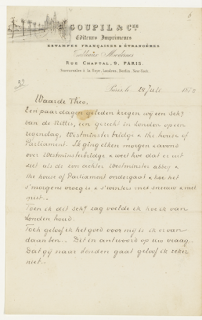[Letterhead: Goupil Paris]
Paris, 15 July 1875
My dear Theo,
Uncle Vincent was here again, we were together quite a lot and talked about one thing and another. I asked him whether he thought there would be an opportunity to get you here, into the Paris branch. At first he wouldn’t hear of it, and said it was much better that you stay in The Hague; but I kept insisting, and you can be sure that he’ll bear it in mind.
When he comes to The Hague he’ll probably talk to you; stay calm and let him have his say; it won’t do you any harm, and later on you’ll probably need him now and again. You shouldn’t talk about me if it’s not the right moment.
He’s terribly clever, when I was here last winter one of the things he said to me was ‘perhaps I know nothing of supernatural things, but of natural things I know everything’. I’m not sure whether those were his exact words, but that was the gist of it.
I also want to tell you that one of his favourite paintings is
‘Lost illusions’ by Gleyre.Sainte-Beuve said, ‘There is in most men a poet who died young, whom the man survived’ and
Musset, ‘know that in us there is often a sleeping poet, ever young and alive’. I believe that the former is true of Uncle Vincent. So you know who it is you’re dealing with, and so be warned.
Don’t hesitate to ask him openly to have you sent here or to London.
I thank you for your letter of this morning, and for the verse by
Rückert. Do you have his poems? I’d like to know more of them. When there’s an opportunity I’ll send you a French Bible and L’imitation de Jesus Christ. This was probably the favourite book of that woman whom P. de Champaigne painted; in the Louvre there’s a portrait, also by P. de C., of her daughter, a nun; she has L’imitation lying on a chair next to her.
Pa once wrote to me: ‘you know that the same lips that uttered “be harmless as doves” also immediately added “and wise as serpents”’. You should bear that in mind as well, and believe me to be ever
Your loving brother
Vincent
Do you have the photos of the
Meissoniers in the gallery? Look at them often; he painted men. You may well know The smoker at the window and The young man having lunch.
















